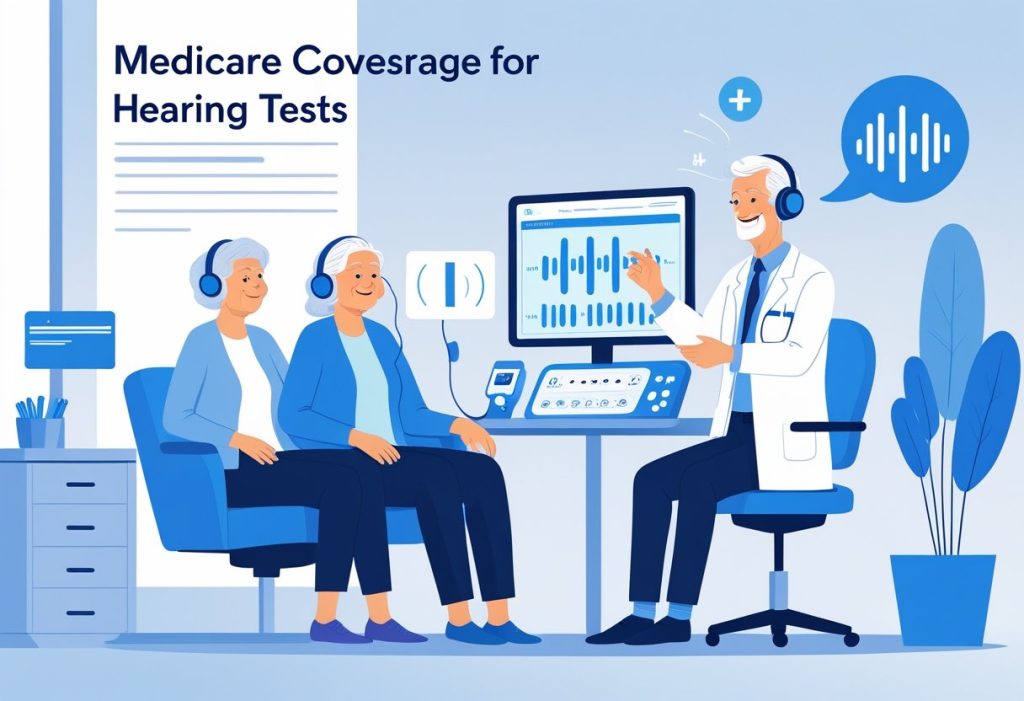Navigating Medicare can be complex, especially when it comes to understanding its coverage for hearing tests. Medicare Part B provides coverage for diagnostic hearing tests if they are deemed medically necessary by your healthcare provider. This coverage is crucial for addressing hearing loss, a common issue among seniors.
As you consider your options, it’s essential to be aware that while diagnostic exams are included, routine hearing tests and hearing aids typically are not covered. This limitation can lead to unexpected out-of-pocket expenses. Working with a knowledgeable partner, like The Modern Medicare Agency, can help you find suitable plans without the burden of additional fees.
Our licensed agents are available for personalized consultations. They are dedicated to identifying Medicare packages that meet your specific needs, ensuring you get the coverage you deserve. By choosing The Modern Medicare Agency, you gain access to expert guidance tailored to your individual circumstances.
Medicare Coverage Details for Hearing Tests
Understanding Medicare’s coverage for hearing tests is essential for ensuring you receive the necessary healthcare services. This section outlines when Medicare covers diagnostic hearing tests, the specifics of balance exams, and the types of hearing exams eligible for coverage.
When Medicare Covers Diagnostic Hearing Tests
Medicare Part B covers diagnostic hearing tests when they are deemed medically necessary. This means your doctor or healthcare provider must order the tests to determine if you need medical treatment for a hearing issue. Coverage primarily applies to tests that assess your hearing capability as part of a broader medical evaluation.
Routine hearing tests are not covered under Medicare. If you are experiencing symptoms like hearing loss, it is crucial to consult your healthcare provider. They can evaluate your condition and decide whether a diagnostic hearing test is warranted, ensuring you get the required coverage.
Coverage for Balance Exams Under Medicare
Balance exams are significant for those experiencing dizziness or balance issues, often related to hearing problems. Medicare Part B covers diagnostic balance exams when performed by a Medicare-approved provider. These exams are essential for determining the cause of balance issues, which may stem from inner ear problems or other medical conditions.
It’s important to note that routine balance assessments and those not ordered by a healthcare provider may not qualify for coverage. Your doctor will assess your symptoms and determine whether a balance exam is necessary, ensuring you have access to necessary care under Medicare.
Types of Hearing Exams Eligible for Coverage
Medicare covers specific types of hearing exams under Part B. The primary focus is on diagnostic exams aimed at identifying hearing disorders or conditions that require medical intervention. This includes comprehensive audiometric evaluations ordered by a healthcare provider.
Hearing tests for fitting hearing aids or routine screenings are not eligible for coverage. To qualify, exams must be medically necessary, focusing on uncovering underlying issues rather than providing general assessments. Consulting with a healthcare provider will help you navigate Medicare’s coverage options effectively.
For personalized assistance with your Medicare insurance needs, consider working with The Modern Medicare Agency. Our licensed agents provide one-on-one consultations to help you find the best Medicare packages that align with your needs, all without costly extra fees.
Eligibility and Process for Medicare-Covered Hearing Tests
Navigating Medicare coverage for hearing tests involves understanding specific eligibility criteria and the steps required to access these services. By knowing the requirements and processes, you can ensure you receive the necessary evaluations for your hearing health.
Requirements for Medical Necessity
Medicare covers hearing tests only when they are deemed medically necessary. This typically means the examination is required to diagnose or assess a medical condition related to hearing loss. To qualify, you will need a prescription from a physician, nurse practitioner, or another eligible provider.
Tests may include a comprehensive hearing evaluation conducted by an audiologist. It’s important that these evaluations are linked to a health issue, such as sudden hearing loss or changes in hearing ability. Routine hearing exams, intended for general hearing maintenance, are generally not covered under Medicare.
How to Get a Referral and Find a Medicare-Approved Provider
To access Medicare-covered hearing tests, you will need a referral from a healthcare provider. Schedule an appointment with your doctor to discuss your hearing concerns. If your doctor believes a hearing evaluation is necessary, they will provide a referral.
Once you have the referral, find a Medicare-approved provider, such as an audiologist, who is eligible to perform the necessary hearing evaluations. To locate a qualified provider, visit the Medicare website or contact The Modern Medicare Agency. Our licensed agents can help you identify suitable providers within your area that accept Medicare, ensuring a smooth process.
Difference Between Diagnostic and Routine Hearing Exams
Understanding the distinction between diagnostic and routine hearing exams is crucial. Diagnostic exams are covered by Medicare and focus on identifying specific medical conditions related to hearing. These tests are administered when there is a medical reason, such as difficulty hearing or sudden changes in hearing capabilities.
Conversely, routine hearing exams are not covered and are typically performed for general monitoring of hearing health without a medical necessity. These tests may be useful for preventative care, but they do not qualify for Medicare coverage. Knowing this difference helps you choose the right type of examination based on your health needs.
Costs and Out-of-Pocket Expenses for Hearing Tests
Understanding the costs associated with hearing tests is crucial for managing your healthcare budget. Various factors contribute to your expenses, including deductibles, where you receive care, and services that Medicare does not cover.
Medicare Part B Deductibles and Coinsurance
Medicare Part B covers diagnostic hearing tests, but you’ll need to pay attention to certain costs. Initially, beneficiaries face an annual deductible, which is set at $226 for 2025. Once you meet this deductible, Medicare typically pays 80% of the approved amount for covered hearing tests. As a result, you will be responsible for the remaining 20% as coinsurance.
If your test is deemed medically necessary and ordered by a physician, this cost-sharing applies. It’s important to check the specifics of your Medicare plan, as coverage details may differ.
Costs in Different Healthcare Settings
Costs for hearing tests can vary significantly depending on where you receive the service. Typically, you might encounter higher fees at private clinics compared to hospitals. For instance, a hearing evaluation at a specialized audiology clinic may range from $200 to $400.
In contrast, many hospitals may charge similar rates, but a portion may be covered by Medicare if the tests are conducted as part of a comprehensive evaluation. Always ask your provider for the estimated costs upfront. Knowing your location and coverage can help minimize unexpected expenses.
Paying for Services Not Covered by Medicare
While Medicare Part B provides some coverage, it does not pay for routine hearing exams or hearing aids. If you need a hearing aid, you might find costs ranging from $1,000 to $4,000 per device. These expenses can be a significant out-of-pocket burden.
If you require hearing services outside of Medicare’s coverage, consider exploring supplemental insurance plans. The Modern Medicare Agency can help you identify options tailored to your specific needs. Our licensed agents work with you to find Medicare packages without hidden fees, ensuring you receive the best possible care without breaking the bank.
Limitations and Exclusions in Medicare Hearing Coverage
Medicare offers limited coverage for hearing services, which can lead to confusion about what is or isn’t included. Understanding these limitations and exclusions can help you make informed decisions regarding your hearing health care.
What Hearing Services Medicare Does Not Cover
Medicare does not cover most hearing services, which can significantly impact your access to necessary care. Specifically, routine hearing exams are not included under Original Medicare. While diagnostic tests may be covered if deemed medically necessary, preventive screenings typically are not. This means unless your doctor determines a medical need, you will have to bear the full costs of regular hearing assessments.
Additionally, services like hearing aid maintenance and follow-up appointments are usually excluded, leading to out-of-pocket expenses. This gap in coverage is crucial for you to consider when planning for your hearing health needs.
Exclusion of Hearing Aids and Fittings
One of the most significant exclusions under Medicare is the coverage of hearing aids. Original Medicare does not pay for hearing aids or fittings, which means those expenses will be entirely your responsibility. Over-the-counter (OTC) hearing aids may provide a more affordable option, but they are not covered by Medicare either.
Many beneficiaries find themselves navigating complex Medicare Advantage plans that might offer some coverage, but this varies greatly depending on the specific plan. Understanding this exclusion upfront can help you explore alternative coverage options more effectively.
Coverage Differences for Routine Preventive Care
When it comes to routine preventive care, any hearing exams deemed as such are generally not covered by Medicare. Diagnostic hearing tests may be reimbursed if ordered for specific medical reasons, such as hearing loss evaluation or balance disorders.
It’s important to be aware of these distinctions so you can avoid unexpected costs. For example, if you only seek evaluations for preventive reasons, you will need to cover these expenses out of pocket. The Modern Medicare Agency can help navigate these nuances and find a Medicare plan suited to your specific hearing care requirements. Our licensed agents provide personalized service, ensuring you understand your options without incurring extra fees.
Expanded Coverage and Alternatives Through Medicare Advantage and Other Plans
When considering hearing tests, understanding your coverage options is vital. Medicare Advantage and other plans can provide enhanced benefits that Original Medicare may not cover. Here’s a closer look at what you should know.
Medicare Advantage Hearing Benefits
Medicare Advantage plans often include additional coverage for hearing services, which Original Medicare typically does not provide. These plans may cover routine hearing exams, hearing aids, and fittings, significantly easing the financial burden of hearing care.
It’s essential to review specific plans, as benefits may vary. Some Medicare Advantage plans offer comprehensive coverage that includes audiology services, allowing you to access a more extensive range of hearing healthcare.
With options for personalized care, you can choose a plan that best fits your needs. This flexibility is crucial in ensuring you receive adequate auditory support while managing costs effectively.
Comparing Original Medicare and Medicare Advantage
Original Medicare (Part A and Part B) generally covers only diagnostic hearing tests deemed medically necessary. However, it does not cover routine hearing exams or hearing aids, leaving many out-of-pocket expenses to the beneficiary.
In contrast, Medicare Advantage plans often provide a broader scope of hearing services. Depending on the plan, you might find coverage for additional testing, fittings, and even discounts on hearing aids.
When selecting a plan, consider the services included, the costs, and your specific hearing needs to find the most advantageous coverage. Access to a thorough benefits comparison is essential when navigating these options.
Exploring Additional Insurance and Medicaid Options
In addition to Medicare Advantage, you may want to explore other insurance options that can help cover hearing care costs. Some supplemental insurance policies or Medigap plans can bridge gaps left by Original Medicare.
Moreover, if you qualify, Medicaid may offer additional assistance for hearing tests and devices, particularly for low-income individuals. Each state has varying rules regarding Medicaid coverage for hearing services, so reviewing your state’s offerings is important.
The Modern Medicare Agency provides assistance in navigating these options. Our licensed agents can help you identify the best coverage that aligns with your healthcare needs, ensuring you get the best possible benefits without added financial stress.
The Importance of Hearing Health and Professional Care
Understanding the significance of hearing health and accessing professional care can greatly impact your quality of life. Early intervention and expert support play crucial roles in maintaining your hearing abilities and overall well-being.
Why Early Hearing Testing Matters
Early hearing testing is essential for identifying hearing loss before it becomes severe. The sooner you know about any hearing issues, the better your chances of effective treatment. Hearing loss can lead to cognitive decline, social isolation, and reduced quality of life.
Regular screening, especially if you’re over 50 or have risk factors, allows for timely interventions. You might find that accessible treatment options can help you manage your condition more effectively. Taking proactive steps ensures you maintain communication with loved ones and participate fully in social activities.
Role of Audiologists in Hearing Care
Audiologists are trained professionals who specialize in diagnosing and treating hearing-related conditions. Their expertise is vital in tailoring hearing healthcare services to fit your unique needs.
When you visit an audiologist, they will conduct comprehensive assessments to determine your specific hearing capabilities. This process includes hearing tests, evaluations of balance, and recommendations for hearing aids or other assistive devices. A personalized hearing care plan can significantly enhance your auditory experience and improve overall communication abilities.
Maintaining Long-Term Hearing Health
To maintain long-term hearing health, regular check-ups with your audiologist are essential. These appointments allow for ongoing assessments and adjustments to your hearing aids, ensuring optimal functioning.
In addition, practicing ear safety and reducing exposure to loud noises can protect your hearing. Engaging in healthy lifestyle choices, such as a balanced diet and regular exercise, supports your auditory system.
The Modern Medicare Agency helps you navigate your Medicare options for hearing care. Our licensed agents work with you to find plans that cover necessary hearing services without incurring extra fees. You can count on us for one-on-one support tailored to your specific needs, ensuring you have access to the best possible hearing healthcare services.
Frequently Asked Questions
Navigating Medicare coverage for hearing tests can be complex. Here are key aspects related to audiometric exams, coverage for hearing aids, the necessity of symptoms, qualifications for services, and limitations on coverage.
How does Medicare cover audiometric exams for beneficiaries?
Medicare typically covers diagnostic hearing and balance exams. These exams must be deemed medically necessary and ordered by a physician or other qualified healthcare provider. Routine hearing tests are not included under this coverage.
Are hearing aids and related fittings covered under Medicare plans?
Medicare does not generally cover hearing aids or the fittings required for them. This means you will likely need to pay out-of-pocket for these services. Many beneficiaries explore supplemental insurance or Medicare Advantage plans that may offer coverage for hearing aids.
Can individuals receive coverage for hearing tests without showing symptoms of hearing loss?
No, Medicare requires that hearing tests be medically necessary based on specific symptoms or complaints. Without such indicators, coverage for hearing tests will not be available. This ensures that evaluations are focused on individuals who genuinely need them.
What are the qualifications for Medicare coverage of audiologist services?
To qualify for Medicare coverage of audiologist services, a hearing test must be ordered by your primary care physician. The order must be based on medical necessity, which means there must be indications that further examination is required for diagnosis or treatment.
Does Medicare Part B cover the costs of hearing exams ordered by a physician?
Yes, Medicare Part B does cover the costs of hearing exams when they are ordered by a physician. These diagnostic exams must be necessary for determining treatment options for medical conditions impacting hearing or balance.
What limitations exist regarding Medicare coverage for hearing-related services?
Medicare coverage for hearing-related services has significant limitations. Routine hearing tests and hearing aids are not covered under Original Medicare. Many beneficiaries seek additional plans or coverage options to address these gaps in hearing health support.
For personalized assistance with your Medicare insurance needs, The Modern Medicare Agency provides licensed agents who will work closely with you. They identify packages tailored to your needs without hidden fees, ensuring you find the right coverage efficiently.






